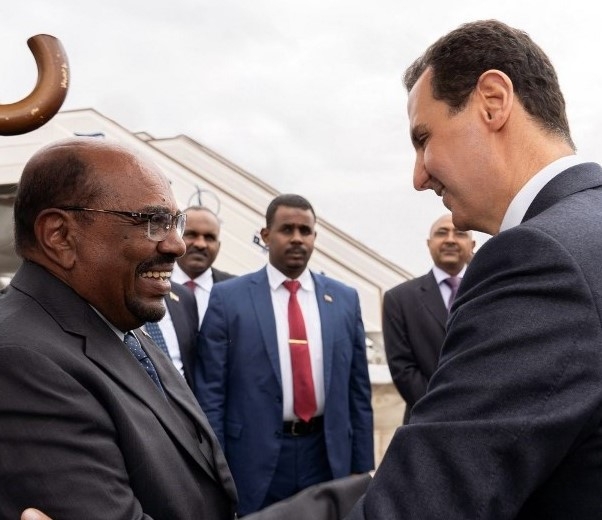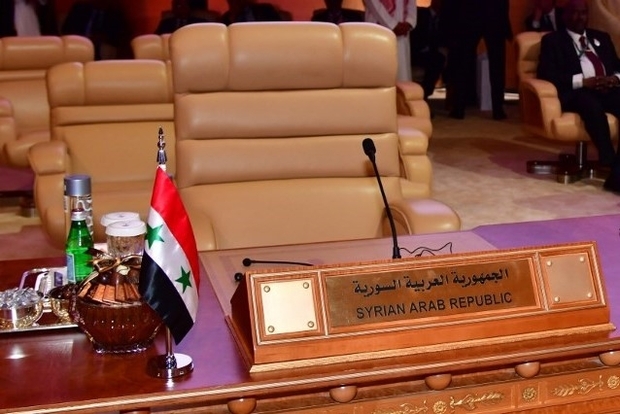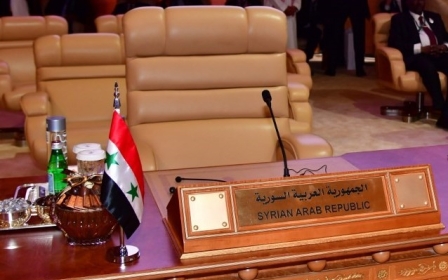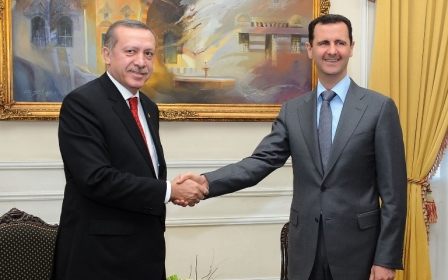Bashir in Damascus: The Arab League’s message to Assad - welcome back

The first visit by an Arab head of state to Damascus since the start of the Syrian conflict is extremely significant not just in terms of the optics but also the message it carries both to President Bashar al-Assad, Iran and the United States.
There has been a step-by-step choreographic strategy both by Damascus and some Arab states that want to reintegrate Syria back into the Arab League and into the regional fold. Syria has been able to survive, and resuscitate, with the help of Russia, and is now looking like a regional power again.
The Sudanese president - himself a survivor who went from being out of favour in Riyadh to being a key ally again for the Saudis and Emiratis – is an important reminder of how regional stances evolve in the Arab world on a day-to-day basis.
Why Bashir?
Though the actual role of Omar al-Bashir in Syria and the Levant is limited, it is his own fall from grace with Egypt, Saudi Arabia and the UAE a few years ago, only to be welcomed again by Cairo and Riyadh, that is significant. Bashir went from being a sanctioned individual to attending a global summit which included US President Donald Trump, albeit under the auspices of the Saudis.
Saudi Arabia's role in the trip is not to be discounted. It's almost inconceivable that the Sudanese president would have travelled to Damascus without a prior nod from Riyadh, and Mohammed bin Salman has publicly acknowledged Assad’s victory and the need to work with the Syrian government to reduce the Iranian footprint in the region.
Sudan - and al-Bashir himself - initially had testy relations with the Saudis and the Egyptians with regards to the role of Qatar and Turkey in Syria.
It's almost inconceivable that the Sudanese president would have travelled to Damascus without a prior nod from Riyadh
There were allegations that Khartoum was supplying weapons to the Syrian rebels. Sudan has also been locked in a geopolitical battle for the Red Sea between the UAE, Turkey and Saudi Arabia. Despite handing over a port to Turkey in December 2017, Sudan publicly denied it was forming a closer military alliance with Turkey. The Saudis were also unhappy with Khartoum's relations with Iran, which have been reduced to a minimum.
So in summary, Bashir survived international and Arab isolation to make a significant comeback as a regional player in Arab affairs with respect to the Horn of Africa. Sudan has also had a devastating civil war which the state has - by and large - survived despite the severing of the country to the south.
Ready to welcome back Assad
The UAE's foreign minister, Anwar Gargash, has already said that throwing Syria out of the Arab League was a mistake. Simultaneously Bahrain and Kuwait have added their names to that of Oman in warmly embracing their Arab brothers from Damascus. A clear message that Bashir brings is that the Arab League is ready to take Syria back and talk to Assad for full restorations of ties.
This also comes after years of negotiations by Egypt and Algeria to help Syria come back into the Arab League. The Arab Parliament has also urged the renewal of Syria's membership. The Arabs have clearly said that Syria is an Arab issue and they do not welcome the continued involvement of Turkey and Iran in the region.
The war in Syria has brought together a realisation that there is no Arab voice in the Levant
The war in Syria has brought together a realisation that there is no Arab voice in the Levant. Lebanon, Syria and Iraq are all seen as domains of the Iranians and Turks. However, history has shown that Syria, despite its smaller size and power, has been able to be the final arbiter of affairs both in Lebanon and to an extent in Iraq.
Syria helped the Saudis kick Saddam Hussein out of Kuwait, and also helped the Arab League to bring the Lebanese civil war to an end.
Enter the Arab League
Barak Barfi, a senior fellow at the New America Foundation, and author Justin Goodarzi have both argued in depth that Iran has never been the absolute overlord that many claim it is, and Syria has indeed been at odds with Iran innumerable times in Iraq and Lebanon in the past. It's this that interests the Saudis and the Arab League the most.
They want Syria to retake its premier position as the main force in the Levant and push back, or scale down at the very least, Iranian and Turkish influence in the region. A leading Lebanese MP recently wrote along similar lines that Syria is about to re-emerge in Lebanon and contrary to popular opinion it will have a different line to Iran.
Some Arab states are also looking to Russia as being a positive influence in the Middle East, after years of American and European failure in Libya, Iraq and Yemen. Russia is seen as a success given how it has managed to decisively alter the course of the war in Syria.
The message was not lost in Washington that the Sudanese president arrived on a Russian plane. Sudan and Bashir have survived losing territory, tension with Egypt and Saudi Arabia and US sanctions, to become a player in the Red Sea.
The Syrian war has shown that Assad was able to deny his enemies a space, despite the coalition of regional and western powers arrayed against him. The message to Damascus and Assad has been delivered that Syria should return to the Arab League, sooner rather than later.
- Kamal Alam is a Visiting Fellow at the Royal United Services Institute (RUSI). He specialises in contemporary military history of the Arab world and Pakistan, he is a Fellow for Syrian Affairs at The Institute for Statecraft, and is a visiting lecturer at several military staff colleges across the Middle East, Pakistan and the UK.
The views expressed in this article belong to the author and do not necessarily reflect the editorial policy of Middle East Eye.
Middle East Eye propose une couverture et une analyse indépendantes et incomparables du Moyen-Orient, de l’Afrique du Nord et d’autres régions du monde. Pour en savoir plus sur la reprise de ce contenu et les frais qui s’appliquent, veuillez remplir ce formulaire [en anglais]. Pour en savoir plus sur MEE, cliquez ici [en anglais].






